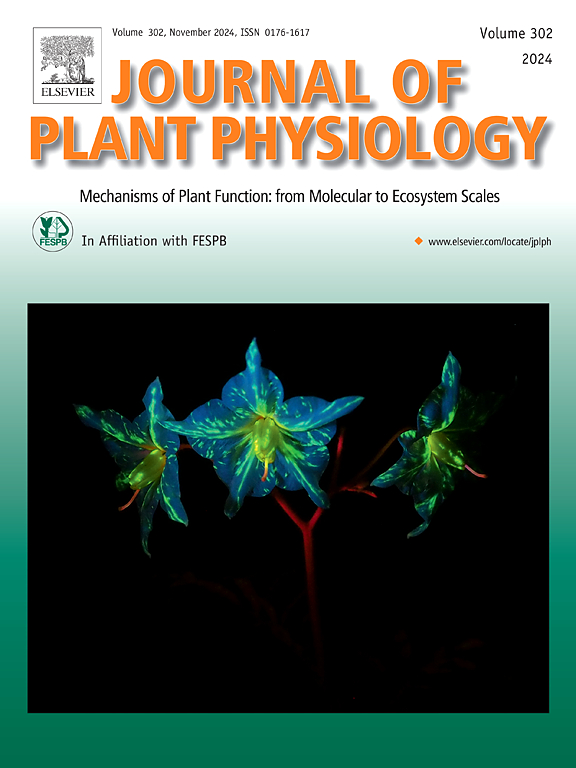三聚体四肽重复蛋白TPR16正调控苹果盐胁迫。
IF 4
3区 生物学
Q1 PLANT SCIENCES
引用次数: 0
摘要
植物在自然生长环境中容易受到各种非生物胁迫,其中盐胁迫会严重影响植物的生长发育和产量。包含三聚体四肽重复序列的蛋白质家族在植物对非生物因子的抗性中起着至关重要的作用,并参与植物生长发育的多个方面。为了这项研究,我们获得了苹果MdTPR16基因。研究表明,MdTPR16在拟南芥中的异位表达导致其对盐胁迫的抗性增强。这是通过在盐胁迫条件下丙二醛(MDA)水平的下降和活性氧(ROS)积累的减少观察到的。同时,过表达MdTPR16的苹果愈伤组织、苹果幼苗和苹果生根苗对盐胁迫的敏感性降低。结果表明,MdTPR16在盐胁迫下具有关键的正调控功能,为深入了解苹果耐盐分子途径奠定基础。本文章由计算机程序翻译,如有差异,请以英文原文为准。
Trimeric tetrapeptide repeat protein TPR16 positively regulates salt stress in apple
Plants are vulnerable to various abiotic stresses in the natural growing environment, among which salt stress can seriously affect plant growth, development and yield. Protein families containing trimeric tetrapeptide repeat sequences have a crucial function in plant resilience to non-living factors and participate in multiple aspects of plant growth and development. For this investigation, we acquired the apple MdTPR16 gene. The research demonstrated that ectopic expression of MdTPR16 in Arabidopsis resulted in increased resistance to salt stress. This was observed by a drop in malondialdehyde (MDA) levels and a reduction in the buildup of reactive oxygen species (ROS) under salt stress conditions. Meanwhile, apple calli, apple seedlings and apple rooting seedlings overexpressing MdTPR16 showed reduced sensitivity to salt stress. The results indicate that MdTPR16 has a critical positive regulatory function under salt stress, which may lay the foundation for a deeper understanding of the molecular pathways of salt tolerance in apple.
求助全文
通过发布文献求助,成功后即可免费获取论文全文。
去求助
来源期刊

Journal of plant physiology
生物-植物科学
CiteScore
7.20
自引率
4.70%
发文量
196
审稿时长
32 days
期刊介绍:
The Journal of Plant Physiology is a broad-spectrum journal that welcomes high-quality submissions in all major areas of plant physiology, including plant biochemistry, functional biotechnology, computational and synthetic plant biology, growth and development, photosynthesis and respiration, transport and translocation, plant-microbe interactions, biotic and abiotic stress. Studies are welcome at all levels of integration ranging from molecules and cells to organisms and their environments and are expected to use state-of-the-art methodologies. Pure gene expression studies are not within the focus of our journal. To be considered for publication, papers must significantly contribute to the mechanistic understanding of physiological processes, and not be merely descriptive, or confirmatory of previous results. We encourage the submission of papers that explore the physiology of non-model as well as accepted model species and those that bridge basic and applied research. For instance, studies on agricultural plants that show new physiological mechanisms to improve agricultural efficiency are welcome. Studies performed under uncontrolled situations (e.g. field conditions) not providing mechanistic insight will not be considered for publication.
The Journal of Plant Physiology publishes several types of articles: Original Research Articles, Reviews, Perspectives Articles, and Short Communications. Reviews and Perspectives will be solicited by the Editors; unsolicited reviews are also welcome but only from authors with a strong track record in the field of the review. Original research papers comprise the majority of published contributions.
 求助内容:
求助内容: 应助结果提醒方式:
应助结果提醒方式:


